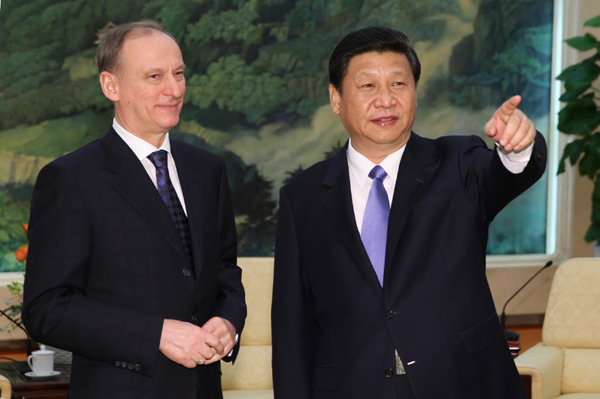Xi's grand vision for new diplomacy
Updated: 2015-01-12 07:30
By Robert Lawrence Kuhn(China Daily)
|
||||||||
 |
|
Xi Jinping (R), general secretary of the Communist Party of China Central Committee, meets with Russian Security Council Secretary Nikolai Patrushev in Beijing, capital of China, Jan 8, 2013. [Photo/Xinhua] |
An "inflection point" in mathematics occurs when there is a change of curvature, say from concave to convex, at a particular point on a curve. There is now, at this particular point of time, an inflection point occurring in China's diplomacy, as the country changes from being reactive to proactive in its international relations. Future historians may characterize this transformation as one of the defining geopolitical trends of the first half of the 21st century.
Many foreigners worry, openly or privately, about what a strong China may do. The so-called China Threat is real in that many foreigners believe it to be real. But do these people know the real China? Deng Xiaoping, China's "Paramount Leader" who initiated reform and opening-up in the late 1970s, said famously that China should "hide our capabilities and bide our time".
Has China's "time" now come? President Xi Jinping has given his clearest directive for China's foreign policy and it is certainly more engaged with the world. Speaking to senior Party officials late last year at a top-level conference on foreign affairs, the first in eight years, Xi described China's new diplomacy.
Articulating the "strategic objectives and principal tasks of foreign affairs work", Xi stressed safeguarding China's core interests, crafting a conducive international environment, and hastening the nation's emergence as a great power. China, he said, should conduct "diplomacy as a great power" in an increasingly "multipolar" world - "making friends and forming partnership networks throughout the world" and "striving to gain more understanding and support from all countries" for the Chinese Dream.
China cannot compete for global leadership with power alone. Economic and military strength, while necessary, are not sufficient. There must also be moral and ethical aspects to China's rise. China, Xi asserted, should "see to it that equal importance is attached to justice and benefits, stress faithfulness, value friendship, carry forward righteousness, and foster ethics".
At a senior session on regional free trade, Xi called for China to "participate and lead, make China's voice heard, and inject more Chinese elements into international rules". To effect such historic change to the world order, Xi is reshaping the diplomatic landscape with "active engagement". From climate change to international peacekeeping, he is changing China from a sometime reluctant follower to an often creative leader. Xi's China has reemerged as a great power and there is no turning back.
- Inspection teams to cover all of military in anti-corruption drive
- Tornado, heavy rain batters Central China's Hunan
- Beijing's five-year plan: Cut population, boost infrastructure
- Palace Museum discovers relics buried for over 600 years
- Disney promises ‘safe, pleasing service of high quality’
- Couple detained for selling their two sons
- Rousseff: Accusations against her 'untruthful'
- Almost one-sixth of Brazil's confirmed microcephaly cases linked to Zika
- Impeachment trial against Rousseff recommended to senate
- With nomination secured, Trump to aim all guns at Hillary Clinton
- Obama sips Flint water, urges children be tested for lead
- Massive protests against Abe mark Japan's Constitution Memorial Day

 Raging wildfire spreads to more areas in west Canada
Raging wildfire spreads to more areas in west Canada
 World's first rose museum to open in Beijing
World's first rose museum to open in Beijing
 Teapot craftsman makes innovation, passes down techniques
Teapot craftsman makes innovation, passes down techniques
 Top 8 iOS apps recommend for mothers
Top 8 iOS apps recommend for mothers
 Five things you may not know about the Start of Summer
Five things you may not know about the Start of Summer
 Art imagines celebrities as seniors
Art imagines celebrities as seniors
 Japanese animator Miyazaki's shop a big hit in Shanghai
Japanese animator Miyazaki's shop a big hit in Shanghai
 Star Wars Day celebrated around world
Star Wars Day celebrated around world
Most Viewed
Editor's Picks

|

|

|

|

|

|
Today's Top News
Liang avoids jail in shooting death
China's finance minister addresses ratings downgrade
Duke alumni visit Chinese Embassy
Marriott unlikely to top Anbang offer for Starwood: Observers
Chinese biopharma debuts on Nasdaq
What ends Jeb Bush's White House hopes
Investigation for Nicolas's campaign
Will US-ASEAN meeting be good for region?
US Weekly

|

|








